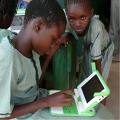Reforestation Has Yet to Take Root in Haiti
 The South Florida Sun Sentinel ran an article concerning the failure of reforestation efforts in Haiti. While little progress has been made to date, there have been small successes. We can learn a great deal by examining the programs which are doing well, asking ourselves why, and then replicating them.
The South Florida Sun Sentinel ran an article concerning the failure of reforestation efforts in Haiti. While little progress has been made to date, there have been small successes. We can learn a great deal by examining the programs which are doing well, asking ourselves why, and then replicating them.











